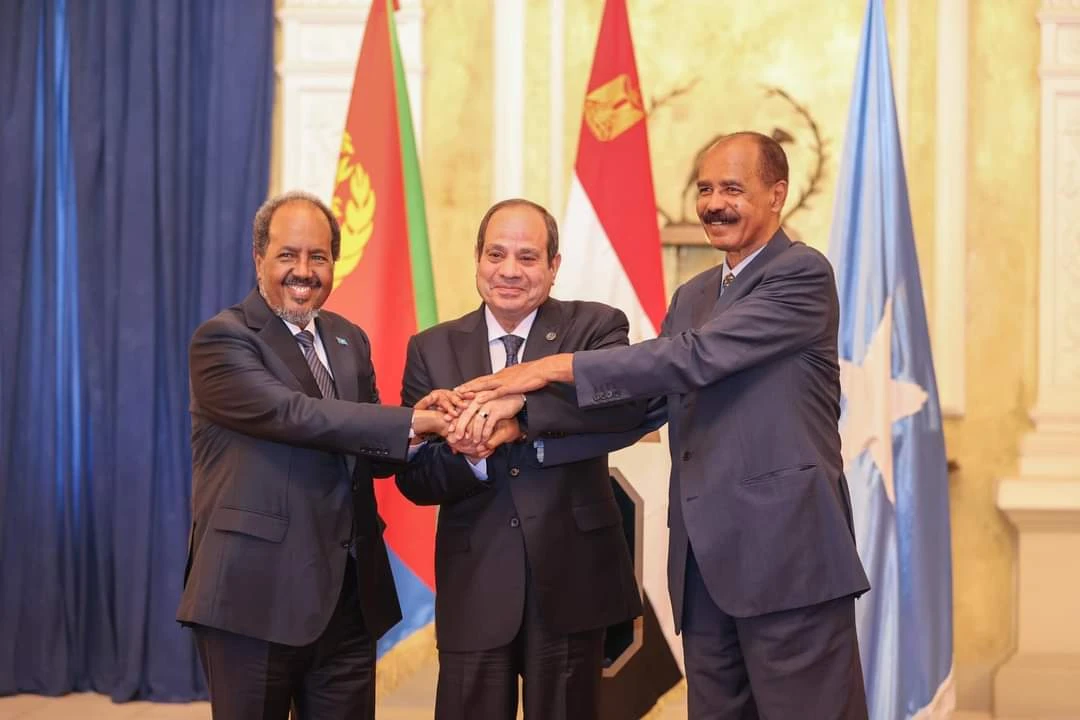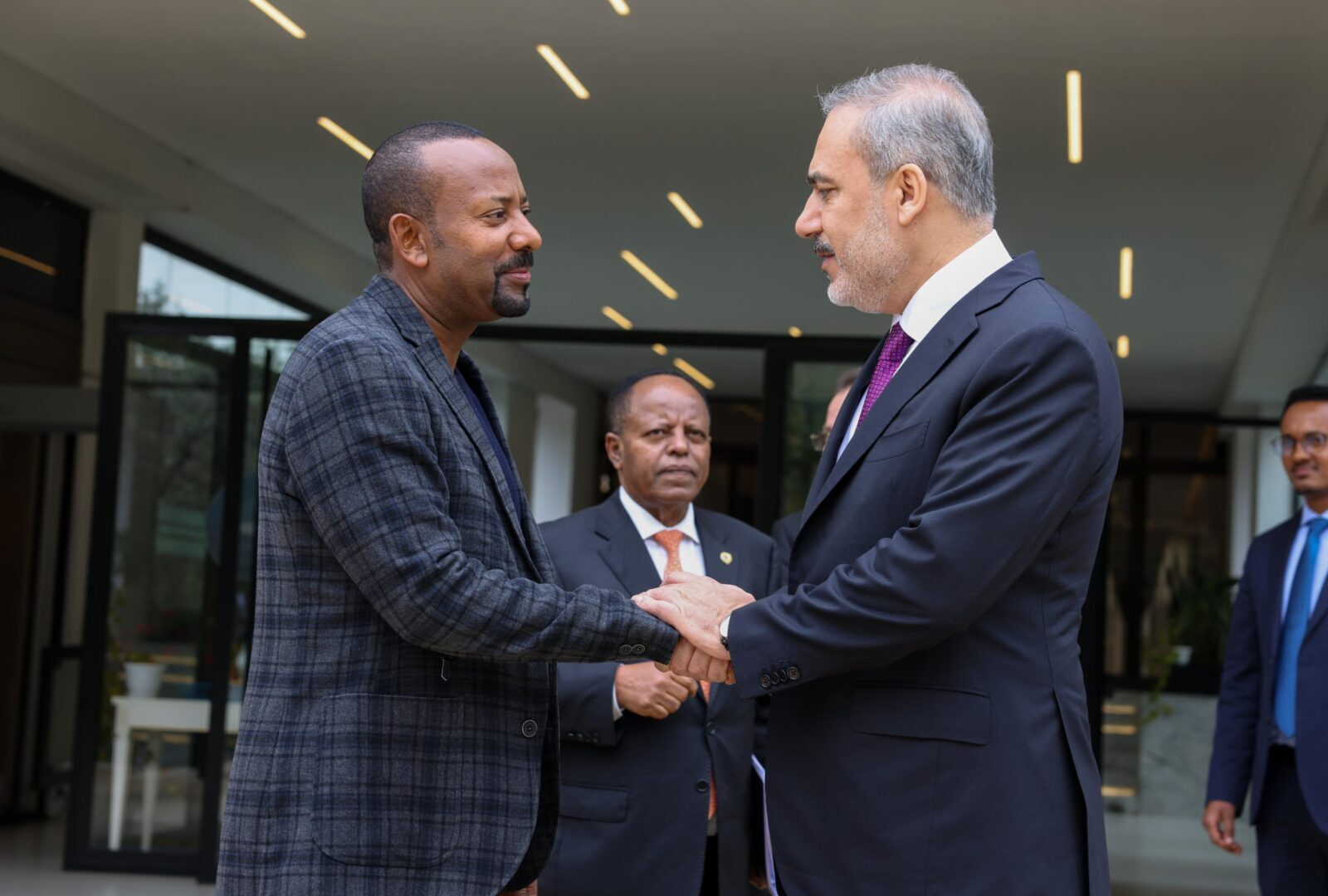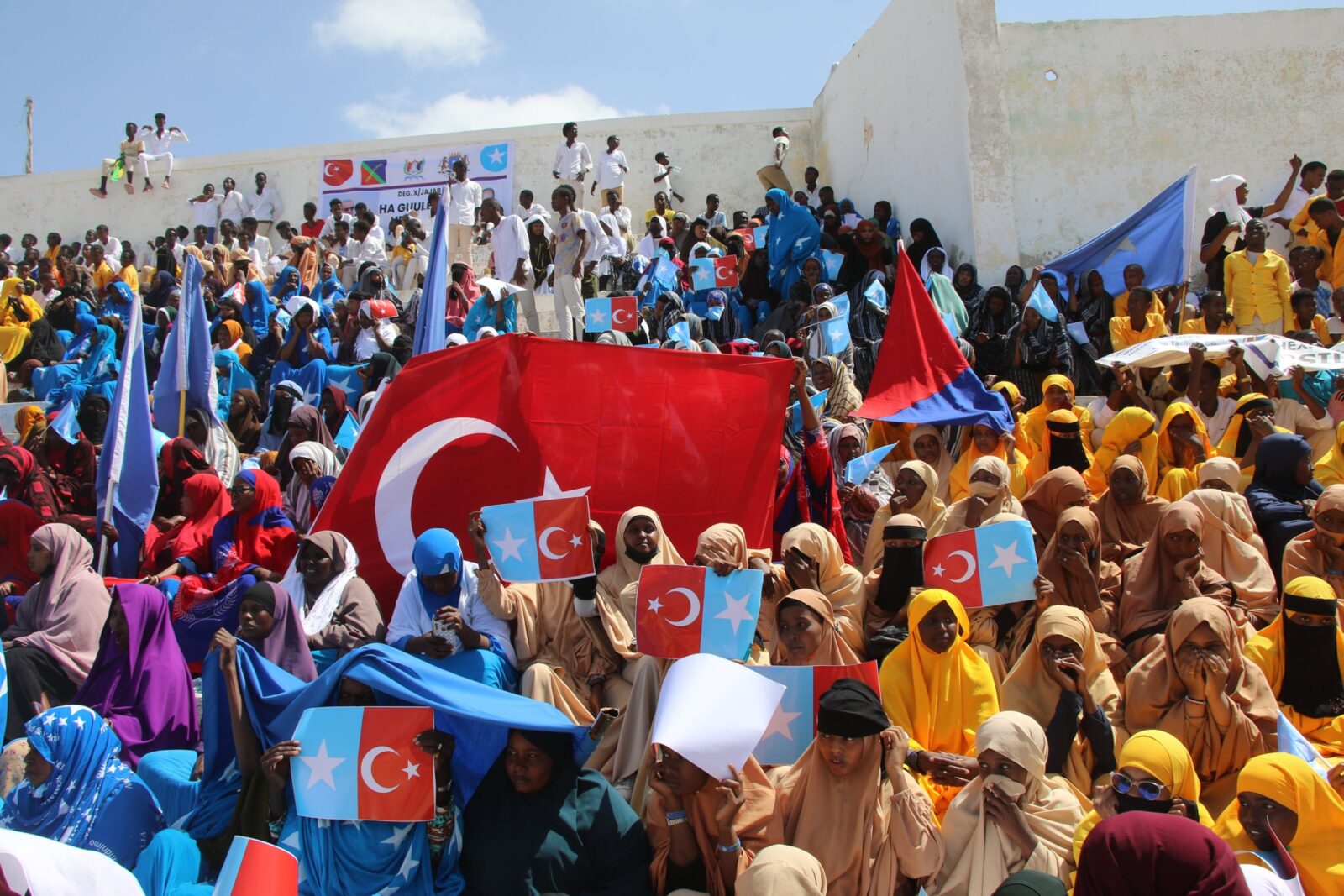Why Somalia-Egypt-Eritrea axis holds strategic importance for world
 Egypt's President el-Sissi with his counterparts Somali President Sheikh Mohamud and Eritrean Isaias Afwerki in their summit meeting in Eritrean capital Asmara. (Photo via SONNA)
Egypt's President el-Sissi with his counterparts Somali President Sheikh Mohamud and Eritrean Isaias Afwerki in their summit meeting in Eritrean capital Asmara. (Photo via SONNA)
The Horn of Africa, a region of immense strategic importance, has long been a focal point of geopolitical interest and conflict. Bordered by the Red Sea and the Gulf of Aden, this area serves as a critical maritime route for global trade, linking the Middle East, Africa and Asia. The region’s significance is further underscored by its proximity to the Bab al-Mandab Strait, a vital chokepoint for international shipping.
Historically, the Horn of Africa has been a theater of complex political dynamics, marked by colonial legacies, ethnic conflicts, and interstate rivalries. The interplay of these factors has often led to instability, making the region a hotspot for international diplomatic and military interventions. In recent years, the geopolitical landscape has been further complicated by the emergence of new alliances and conflicts, driven by both regional ambitions and global strategic interests.
At the heart of the Horn, Somalia has been a key player in these dynamics. Despite facing internal challenges, including prolonged civil conflict and the threat of terrorism, Somalia’s strategic location has made it a pivotal actor in regional politics. The country’s coastline along the Indian Ocean and its proximity to key maritime routes have endowed it with significant geopolitical leverage.
The recent trilateral summit held in Asmara, Eritrea, marks a significant development. The summit, which brought together the leaders of Somalia, Eritrea and Egypt, showed the evolving alliances and strategic realignments in the region. As these nations navigate the complex web of regional and international interests.
Somalia’s strategic position in the Horn of Africa has long influenced its role in regional and international politics. Located along the eastern coast of Africa, Somalia boasts the longest coastline on the continent, stretching over 3,300 kilometers (205.05 miles) along the Indian Ocean and the Gulf of Aden. This prime location has historically made Somalia a crucial player in maritime trade routes, connecting Africa to the Middle East and beyond.
Key events leading up to current situation
Somalia has made significant strides toward rebuilding its state institutions and restoring stability. The establishment of the Federal Government of Somalia in 2012 marked a turning point, with efforts focused on strengthening governance, security and economic development. However, the country continues to face challenges, including the threat of terrorism from groups like Al-Shabaab and ongoing internal conflicts.
The geopolitical landscape of the Horn of Africa has been further complicated by recent developments, such as the Ethiopia-Somaliland agreement. These events have highlighted the strategic importance of Somalia and its role in regional politics. The Ethiopia-Somaliland agreement, in particular, has been a catalyst for increased tensions, as it involves access to the port of Berbera and plans for a naval base on the Red Sea.
Somalia’s response to these developments has been marked by a proactive diplomatic strategy, seeking to build alliances and strengthen its defense capabilities. The defense agreement with Egypt and the involvement of Eritrea in the trilateral summit are indicative of Somalia’s efforts to navigate the complex regional dynamics and assert its sovereignty.
New era of cooperation
On October 10, 2024, a crucial trilateral summit took place in Asmara, Eritrea, bringing together the leaders of Somalia, Eritrea and Egypt. This summit marked a significant moment in the geopolitical landscape of the Horn of Africa, highlighting the evolving alliances and strategic realignments in the region.
The summit, hosted by Eritrean President Isaias Afwerki, saw the participation of Somali President Hassan Sheikh Mohamud and Egyptian President Abdel Fattah el-Sissi. The leaders engaged in comprehensive consultations on a range of regional and international issues, with a particular focus on fostering regional stability, cooperation and adherence to the core principles of international law.
One of the key outcomes of the summit was the reaffirmation of the importance of respecting the sovereignty and territorial integrity of all nations in the region. The leaders emphasized their commitment to preventing interference in the internal affairs of other countries, a principle that is particularly significant for Somalia as it continues to rebuild its state institutions and assert its sovereignty.
The summit also resulted in a commitment to coordinate efforts to promote peace and stability in the region. This includes enhancing the capabilities of the Somali National Army to combat terrorism and protect Somalia’s land and maritime borders. The leaders welcomed Egypt’s proposal to contribute peacekeeping forces to Somalia.
Another significant outcome of the summit was the agreement to establish a trilateral joint committee, led by the Foreign Ministers of Eritrea, Egypt and Somalia. This committee is tasked with further enhancing strategic cooperation among the three countries. The establishment of this committee is a clear indication of the commitment of all three nations to work together to address common challenges and promote regional stability.
Addressing regional security, cooperation
The summit also provided a platform for the leaders to discuss key regional security issues, including the crisis in Sudan and the broader security dynamics in the Horn of Africa. The leaders recognized the importance of cooperation among the coastal states bordering the Red Sea and the Bab al-Mandab Strait, a region of critical strategic importance for global maritime trade.
For Somalia, the outcomes of the trilateral summit represent a significant step forward in its efforts to strengthen its regional alliances and enhance its security capabilities. The deepening cooperation with Egypt and Eritrea provides Somalia with valuable support as it continues to address its internal challenges and assert its role in the region.
Ethiopia-Somaliland agreement
The geopolitical landscape of the Horn of Africa was significantly altered on January 1, 2024, when Ethiopia signed an agreement with the breakaway region of Somaliland. This agreement, which grants Ethiopia access to the port of Berbera and includes plans to establish a naval base on the Red Sea, has been a major catalyst for regional tension.
The agreement has been met with strong opposition from Somalia, which views Somaliland as an integral part of its territory. The Somali government swiftly took a series of actions that included expelling the Ethiopian ambassador to Somalia, signaling its disapproval and escalating diplomatic tensions. Somalia’s stance is rooted in its commitment to maintaining its territorial integrity and sovereignty.
The international community has also reacted to the agreement with concern. Many countries and international organizations have called for dialogue and restraint, emphasizing the need for peaceful resolution of disputes. The agreement has drawn attention to the broader issues of regional stability and the potential for conflict in the Horn of Africa.
Despite mounting international pressure, Ethiopia has refused to walk back to the agreement. Instead, it has engaged in a war of words with Somalia, further heightening tensions. The situation has been exacerbated by Ethiopia’s alleged support for armed factions within Somalia, which the Somali government has condemned as illegal and destabilizing.
The geopolitical stakes have been raised with Somalia seeking support from other countries to bolster its defense capabilities. The defense agreement with Egypt, signed on August 14, 2024, is a direct response to the perceived threat from Ethiopia. This agreement has taken the geopolitical tension to a new level, with both countries engaging in a dangerous game of bluffs and military posturing.
Implications for regional stability
The Ethiopia-Somaliland agreement and the subsequent escalation of tensions have significant implications for regional stability. The Horn of Africa is already a volatile region, and the potential for conflict between Somalia and Ethiopia adds another layer of complexity.
The Ethiopia-Somaliland agreement has been a major catalyst for tension in the Horn of Africa. The strategic interests of the parties involved, coupled with the broader regional dynamics, have created a complex and potentially volatile situation. As Somalia navigates these challenges, its diplomatic and military strategies will play a crucial role in shaping the future stability of the region.
Garnering international support
Somalia’s diplomatic efforts have been characterized by a concerted push to gain the backing of influential international actors. Recognizing the importance of global support in its quest for stability and sovereignty, Somalia has engaged in extensive diplomatic outreach. This includes high-level meetings, participation in international forums, and strategic partnerships with key countries.
One of the most significant outcomes of these efforts has been the strengthening of ties with Egypt. The defense agreement signed on August 14, 2024, between Somalia and Egypt is a clear indication of the deepening military and strategic cooperation between the two nations. This agreement not only enhances Somalia’s defense capabilities but also signals a united front against common regional threats, particularly from Ethiopia.
Building strategic alliances
Somalia’s diplomatic strategy has also focused on building alliances with countries that share common interests and concerns. The trilateral summit in Asmara, which brought together Somalia, Eritrea and Egypt, is a prime example of this approach. The summit resulted in the establishment of a trilateral joint committee, aimed at enhancing strategic cooperation and addressing regional security challenges.
Eritrea’s involvement in this alliance is particularly noteworthy. Historically, Eritrea has had a contentious relationship with Ethiopia, and its alignment with Somalia and Egypt represents a significant shift in regional dynamics. By forging this alliance, Somalia has not only strengthened its position but also created a broader coalition to counterbalance Ethiopia’s influence in the region.
Navigating complex geopolitical dynamics
Somalia’s diplomatic maneuvers are taking place against a backdrop of complex and often volatile geopolitical dynamics. The Ethiopia-Somaliland agreement, which grants Ethiopia access to the port of Berbera and includes plans for a naval base, has been a major catalyst for regional tension. Somalia’s expulsion of the Ethiopian ambassador and its accusations of Ethiopia arming factions within Somalia are indicative of the high stakes involved.
Details of defense agreement
The defense pact between Somalia and Egypt encompasses a wide range of military cooperation initiatives. Key components of the agreement include:
- Military hardware, training: Egypt has committed to providing Somalia with advanced military hardware, including armored vehicles, artillery, and surveillance equipment. Additionally, Egyptian military experts will train Somali forces, enhancing their operational capabilities and readiness.
- Joint military exercises: The agreement outlines plans for joint military exercises aimed at improving coordination and interoperability between the two armed forces. These exercises will focus on counterterrorism operations, border security, and maritime defense.
- Intelligence sharing: Enhanced intelligence sharing is a critical aspect of the agreement. By pooling their intelligence resources, Somalia and Egypt aim to improve their ability to detect and respond to security threats, particularly those posed by terrorist groups and regional adversaries.
- Peacekeeping support: Egypt has also pledged to contribute peacekeeping forces to Somalia, supporting the country’s efforts to stabilize its internal security situation and combat terrorism. This commitment underscores Egypt’s broader strategic interest in promoting stability in the Horn of Africa.
Impact on Somalia’s military capabilities
The defense agreement with Egypt significantly boosts Somalia’s military capabilities. The provision of advanced military hardware and training will enhance the effectiveness of the Somali National Army (SNA), enabling it to better address internal security challenges and protect the country’s borders. The joint military exercises and intelligence sharing will further strengthen Somalia’s defense posture, improving its ability to respond to both conventional and asymmetric threats.
The presence of Egyptian peacekeeping forces in Somalia also provides a critical layer of support, helping to stabilize regions affected by conflict and terrorism. This support is particularly important as Somalia continues to rebuild its state institutions and assert its sovereignty.
Eritrea’s role in regional dynamics
Eritrea’s involvement in the evolving geopolitical landscape of the Horn of Africa is a significant development that has far-reaching implications for regional stability and security. As a nation with a complex history and strategic interests, Eritrea’s alignment with Somalia and Egypt marks a notable shift in the regional power dynamics.
Eritrea’s strategic interests
Eritrea, under the leadership of President Isaias Afwerki, has long pursued a policy of strategic autonomy and regional influence. The country’s location along the Red Sea coast provides it with significant strategic leverage, particularly in terms of maritime security and trade routes. Eritrea’s ports, including Massawa and Assab, are critical assets that enhance its geopolitical importance.
Historically, Eritrea has had contentious relations with its neighbors, particularly Ethiopia. The two countries fought a brutal border war from 1998 to 2000, and although a peace agreement was signed in 2018, tensions have persisted. Eritrea’s strategic interests are shaped by its desire to maintain its sovereignty, secure its borders, and assert its influence in the region.
Eritrea’s involvement in trilateral alliance
Eritrea’s participation in the trilateral summit with Somalia and Egypt is a clear indication of its strategic realignment. By joining forces with Somalia and Egypt, Eritrea aims to bolster its regional influence and counterbalance Ethiopia’s growing power. The trilateral alliance provides Eritrea with a platform to engage in regional security discussions and coordinate efforts to address common threats.
The establishment of a trilateral joint committee, led by the Foreign Ministers of Eritrea, Egypt and Somalia, is a significant outcome of the summit. This committee is tasked with enhancing strategic cooperation and addressing regional security challenges. Eritrea’s involvement in this committee shows its commitment to playing a proactive role in regional affairs.
Significance of Eritrea joining Somalia-Egypt Pact
Eritrea’s alignment with Somalia and Egypt has several implications for regional dynamics:
- Strengthening regional alliances: Eritrea’s participation in the alliance strengthens the collective bargaining power of the three nations. This united front is particularly important in countering Ethiopia’s influence and addressing shared security concerns.
- Enhancing military cooperation: Eritrea’s military capabilities, combined with those of Somalia and Egypt, create a formidable force in the region. The alliance facilitates joint military exercises, intelligence sharing, and coordinated defense strategies, enhancing the overall security posture of the member states.
- Economic, strategic benefits: The alliance provides Eritrea with economic and strategic benefits, including access to new markets and investment opportunities. Enhanced cooperation with Somalia and Egypt can lead to joint infrastructure projects, trade agreements and economic development initiatives.
- Regional stability, security: Eritrea’s involvement in the alliance contributes to regional stability and security. By working together, the member states can address common threats, such as terrorism and maritime piracy, more effectively. The alliance also serves as a deterrent to external aggression and interference.
Türkiye’s balancing act
Türkiye’s involvement in the Horn of Africa presents a unique and complex dimension to the region’s geopolitical dynamics. As a nation with significant economic and political interests in both Somalia and Ethiopia, Türkiye finds itself in a delicate position, striving to maintain its relationships with both countries while navigating the escalating tensions.
Türkiye’s economic, political interests
Türkiye has established a firm presence in the Horn of Africa, particularly in Somalia, where it has invested heavily in infrastructure, education and humanitarian aid. Since 2011, Türkiye has been a key partner in Somalia’s reconstruction efforts, providing substantial financial and technical assistance. The Turkish government and private sector have been involved in numerous projects, including the construction of roads, hospitals and schools, as well as the development of Mogadishu’s international airport and seaport.
In Ethiopia, Türkiye has also made significant investments, particularly in the manufacturing and construction sectors. Turkish companies operate numerous factories and construction projects across Ethiopia, contributing to the country’s economic growth and industrialization. The strong economic ties between Türkiye and Ethiopia are complemented by political and diplomatic engagements, with both countries seeking to enhance bilateral cooperation.

Challenges of balancing relationships
The escalating tensions between Somalia and Ethiopia pose a significant challenge for Türkiye. As a key partner to both nations, Türkiye must carefully navigate its diplomatic and economic engagements to avoid alienating either side. This balancing act requires a nuanced approach, taking into account the strategic interests and sensitivities of both Somalia and Ethiopia.
Türkiye’s involvement in Somalia’s reconstruction and development has earned it considerable goodwill and influence in the country. However, its economic interests in Ethiopia are also substantial, making it imperative for Türkiye to maintain a positive relationship with both nations. The challenge lies in managing these relationships without being perceived as taking sides in the conflict.
Diplomatic efforts, mediation
Türkiye has sought to play a mediating role, leveraging its strong ties with both Somalia and Ethiopia to promote dialogue and peaceful resolution of disputes. Turkish diplomats have engaged in shuttle diplomacy, holding discussions with leaders in both countries to encourage restraint and cooperation.
Türkiye’s mediation efforts are aimed at de-escalating the situation and fostering a climate of dialogue and negotiation. By positioning itself as a neutral and constructive actor, Türkiye hopes to contribute to regional stability and prevent the conflict from escalating further.

Opportunities for Türkiye
Despite the challenges, Türkiye’s involvement in the Horn of Africa also presents opportunities. By successfully mediating between Somalia and Ethiopia, Türkiye can enhance its reputation as a key diplomatic player in the region. This role can strengthen Türkiye’s influence and open up new avenues for economic and political cooperation.
Somalia’s domestic struggles
While Somalia navigates the complex geopolitical landscape of the Horn of Africa, it simultaneously faces significant internal challenges that impact its stability and development. These domestic struggles are intertwined with the broader regional dynamics, influencing and being influenced by the external environment.
Combating terrorism, insurgency
One of the most pressing internal challenges for Somalia is the ongoing threat of terrorism and insurgency, primarily from the militant group Al-Shabaab. Despite significant gains made by the Somali National Army (SNA) and international partners, Al-Shabaab remains a potent threat, capable of carrying out attacks and destabilizing regions.
The defense agreement with Egypt, which includes provisions for military hardware and training, is a critical component of Somalia’s strategy to combat terrorism. Enhanced military capabilities and intelligence sharing with Egypt and other allies are essential for improving the effectiveness of counterterrorism operations.
ABOUT THE AUTHOR
Senior Advisor, Somalia’s Ministry of Information



